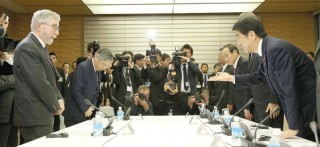Loading
Search
▼ Krugman Urges Japan’s Expansion Of Fiscal Action
- Category:Other
The Yomiuri Shimbun
Nobel Prize-winning American economist Paul Krugman on Tuesday expressed a negative view on the Japanese government’s plan to raise the consumption tax rate from 8 percent to 10 percent in April 2017.
At the third round of the international financial and economic analysis meetings — at which Prime Minister Shinzo Abe and other Cabinet members have been exchanging opinions with invited experts to analyze the global economic trends — the 63-year-old professor at the City University of New York also insisted the Japanese government take more fiscal measures to expand its expenditures and stimulate the economy.
His view on the consumption tax hike echoed that of fellow Nobel laureate Joseph Stiglitz, 73, who took a stance opposing the government plan during the meetings’ first round on March 16.
Krugman’s Tuesday remarks suggested his belief that the importance of the government’s fiscal policies has increased as the Bank of Japan now has only limited options for its monetary easing polices.
The prominent economist expressed a positive view on the negative interest rate policy implemented by the central bank, even while saying the move could not be an economic cure-all.
The Abenomics economy policy package is centered on the so-called “three arrows” — bold monetary easing, flexible fiscal stimulus and growth strategy.
Krugman described a problem in Abenomics as it currently exists, saying it places too much weight on the central bank’s monetary easing policies. He also called it a problem not to exercise fiscal measures even though there are budgetary and national debt issues, insisting the government exercise them for the next few years without worrying about the fiscal balance.
Regarding the world economy, Krugman expressed concern about the prevailing weakness. He stressed the necessity of Japan’s exercise of fiscal measures as part of international policy coordination to rebuild the global economy.
He has been calling for the postponement of the tax hike for some time. When he had a meeting with Abe in November 2014, he advised the prime minister to delay the tax hike. After the meeting, Abe announced that the implementation of the tax increase would be postponed until April 2017, halting the initial plan that had been slated for October 2015.
Nobel Prize-winning American economist Paul Krugman on Tuesday expressed a negative view on the Japanese government’s plan to raise the consumption tax rate from 8 percent to 10 percent in April 2017.
At the third round of the international financial and economic analysis meetings — at which Prime Minister Shinzo Abe and other Cabinet members have been exchanging opinions with invited experts to analyze the global economic trends — the 63-year-old professor at the City University of New York also insisted the Japanese government take more fiscal measures to expand its expenditures and stimulate the economy.
His view on the consumption tax hike echoed that of fellow Nobel laureate Joseph Stiglitz, 73, who took a stance opposing the government plan during the meetings’ first round on March 16.
Krugman’s Tuesday remarks suggested his belief that the importance of the government’s fiscal policies has increased as the Bank of Japan now has only limited options for its monetary easing polices.
The prominent economist expressed a positive view on the negative interest rate policy implemented by the central bank, even while saying the move could not be an economic cure-all.
The Abenomics economy policy package is centered on the so-called “three arrows” — bold monetary easing, flexible fiscal stimulus and growth strategy.
Krugman described a problem in Abenomics as it currently exists, saying it places too much weight on the central bank’s monetary easing policies. He also called it a problem not to exercise fiscal measures even though there are budgetary and national debt issues, insisting the government exercise them for the next few years without worrying about the fiscal balance.
Regarding the world economy, Krugman expressed concern about the prevailing weakness. He stressed the necessity of Japan’s exercise of fiscal measures as part of international policy coordination to rebuild the global economy.
He has been calling for the postponement of the tax hike for some time. When he had a meeting with Abe in November 2014, he advised the prime minister to delay the tax hike. After the meeting, Abe announced that the implementation of the tax increase would be postponed until April 2017, halting the initial plan that had been slated for October 2015.
- March 26, 2016
- Comment (0)
- Trackback(0)


